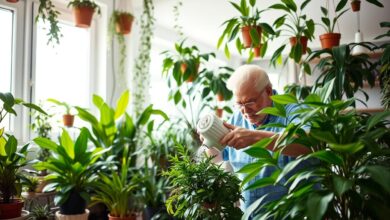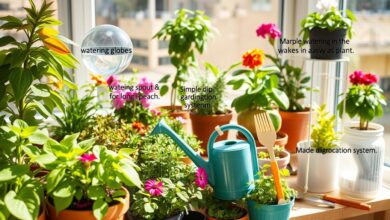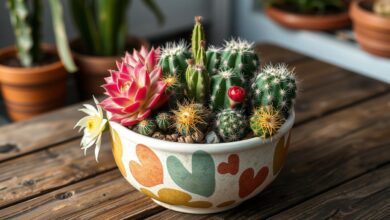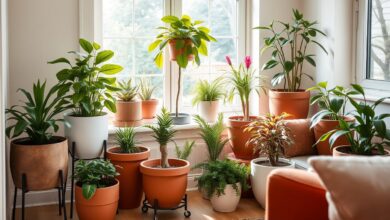Container Gardening for Seniors: Easy Growing Tips
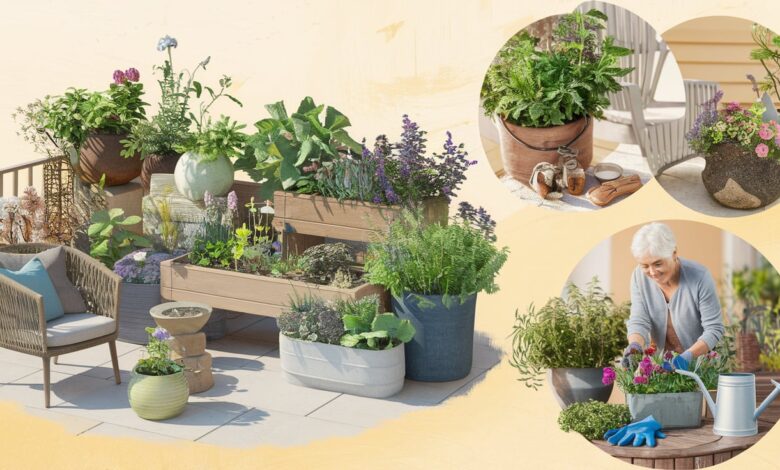
Gardening is an excellent opportunity for older adults to stay active and spend time outdoors. But sometimes large, in-ground gardens are impractical. Don’t let small yards or mobility issues stop you. Try container gardening for Senior Citizens. Use pots and planters to grow plants on the patio or porch. Container gardens are excellent for older adults with mobility issues. Arranging potted plants close to the house on higher surfaces means less walking, bending, and reaching. Plus, the patio provides a level walking area so there are fewer trip hazards compared to an in-ground garden.
Key Takeaways
- Container gardening is a great option for seniors with limited space or mobility
- Patio and porch container gardens reduce walking, bending, and reaching
- Elevated planters and raised beds make gardening more accessible for older adults
- Lightweight, durable materials like plastic or resin are ideal for senior gardeners
- Herbs, vegetables, and flowers can all thrive in container gardens
Table of Contents
The Benefits of Container Gardening for Seniors
Container gardening offers a wealth of advantages for seniors, making it an accessible and rewarding hobby. With limited mobility or physical constraints, seniors can enjoy the therapeutic benefits of gardening by tending to potted plants placed conveniently close to their homes. Accessible gardening for limited mobility is a game-changer, allowing seniors to engage in their green-thumb passions without the challenges of traditional in-ground gardens.
Moreover, low-maintenance gardening for aging gardeners is another key perk of container gardening. Potted plants generally require less frequent watering, weeding, and pruning compared to their in-ground counterparts. This reduced workload is a boon for seniors, enabling them to savor the joys of gardening without the physical strain. Container gardens also provide a level, slip-resistant surface, minimizing trip hazards that can be common in outdoor gardens.
Beyond the practical advantages, container gardening offers profound therapeutic benefits for seniors. Studies have shown that therapeutic gardening for dementia patients can help reduce stress, improve mood, and enhance cognitive function. The sensory stimulation of sight, smell, and touch, coupled with the satisfaction of nurturing plants, can have a profoundly positive impact on the mental and physical well-being of older adults.
With the right senior-friendly gardening tools and a little creativity, container gardening can be a truly transformative activity for seniors. Whether they’re growing herbs, vegetables, or vibrant flowers, the joy and fulfillment of tending to their own garden can be truly life-enriching.
Types of Containers for Senior Gardening
When it comes to container gardening for seniors, the options are diverse and creative. The key is to choose lightweight and durable materials that are easy to manage, such as plastic, resin, or plastic blends. These materials are much lighter than traditional options like terra cotta or concrete, making them more senior-friendly gardening tools.
Lightweight and Durable Materials
Plastic, resin, and plastic blend containers are excellent choices for senior gardeners. They are typically easier to lift and move around compared to heavier alternatives. This is particularly important for older adults who may have limited mobility or strength. Additionally, these materials are weather-resistant and can withstand the elements, ensuring your container garden thrives season after season.
Creative Container Options
- Repurposed storage containers: Get creative by drilling drainage holes in the bottom of plastic storage bins or laundry baskets and lining them with landscaping fabric.
- Nursery cans: These containers are specifically designed for plants and can provide a long-lasting solution for your senior-friendly container garden.
- Self-watering planters: Look for self-watering containers that can reduce the frequency of watering, making gardening more manageable for older adults.
When planning your container garden, consider the mature size of the plants and choose containers that provide enough soil volume for their roots to develop properly. Compact vegetable varieties for containers, such as cherry tomatoes, peppers, and leafy greens, can thrive in smaller spaces and are perfect for senior gardeners.
“Gardening is a wonderful way for seniors to stay active and connect with nature, and container gardening makes it even more accessible.”
Herbs for Container Gardening for Seniors
For older adults, container gardening can be an excellent way to enjoy the therapeutic benefits of growing plants, even with limited mobility or outdoor space. When it comes to container gardening, herbs make an ideal choice for seniors. These versatile plants are easy to grow, require minimal maintenance, and can thrive in small spaces like windowsills or patios.
Some of the most popular herbs for indoor container gardening include:
- Mint – A hardy, fast-growing herb that can be grown in pots and brings a refreshing aroma to any space.
- Thyme – A low-maintenance herb that thrives in containers and adds flavor to many dishes.
- Sage – A flavorful herb that is easy to grow and can be used in a variety of savory recipes.
- Oregano – A versatile herb that grows well in containers and is a staple in Mediterranean cuisine.
- Basil – A fragrant herb that is perfect for growing in pots and adds a burst of flavor to sauces, pestos, and more.
- Chives – A low-growing herb that is easy to maintain and adds a mild onion flavor to dishes.
- Parsley – A hardy herb that thrives in containers and is a essential ingredient in many recipes.
- Rosemary – A drought-tolerant herb that grows well in pots and imparts a woodsy aroma.
- Cilantro – A flavorful herb that is perfect for growing in containers and adds a unique taste to dishes.
The ease of growing herbs indoors makes them a popular choice for seniors who want to enjoy the benefits of gardening without the physical demands of an outdoor garden. With the right container, soil, and care, these fragrant and flavorful plants can thrive in even the smallest of living spaces, bringing a touch of nature and culinary delight to the lives of older adults.
Vegetables Ideal for Container Gardening
When it comes to container gardening for seniors, the options extend far beyond just herbs. Many salad crops, root vegetables, and summer vegetables can thrive in the confined space of patio vegetable planters for seniors. From compact vegetable varieties for containers to classic favorites, there are plenty of flavorful and low-maintenance options to choose from.

Root Vegetables for Containers
Root vegetables like carrots and radishes are well-suited for container gardening. These compact vegetables don’t require a lot of depth, making them ideal for growing in pots and planters. Other root veggies that perform well in containers include potatoes and garlic.
Leafy Greens and Summer Vegetables
Beyond root crops, leafy greens and summer favorites can also flourish in patio vegetable planters for seniors. Lettuce, cabbage, and Swiss chard are all excellent options, providing nutrient-rich harvests. For the summer months, consider growing peppers and tomatoes in your container garden, as they thrive in the limited space.
When selecting vegetables for your container garden, opt for compact varieties labeled as “dwarf” or “container-friendly.” These cultivars are specifically bred to grow well in the confined space of planters and pots, ensuring a bountiful harvest even in small-space gardens.
Flowering Plants for Senior Container Gardens
When it comes to container gardening for seniors, colorful flowering plants can add a vibrant touch to any outdoor oasis. From classic annuals to low-maintenance perennials, there are plenty of blooming beauties that thrive in pots and planters. This makes them an ideal choice for seniors who want to enjoy the beauty of a garden without the physical demands of traditional in-ground planting.
Some fan-favorite flowering options for senior container gardens include geraniums, snapdragons, zinnias, salvias, marigolds, petunias, lavender, and impatiens. These plants not only offer a diverse array of colors and textures but also tend to be relatively low-maintenance, requiring minimal pruning and deadheading to keep them looking their best.
- Geraniums: These iconic bloomers come in a wide range of shades, from bold reds and pinks to softer lavenders and whites. They’re known for their lush, long-lasting flowers and compact, tidy growth habit.
- Snapdragons: Tall and stately, snapdragons add a touch of whimsy to container gardens with their unique, antique-inspired blooms. They come in a variety of hues, from pastel shades to vibrant jewel tones.
- Zinnias: These cheerful annuals are a classic choice for container gardens, offering a burst of color in shades of red, orange, yellow, and pink. They’re easy to grow and require minimal care.
For seniors who prefer a more subtle, soothing aesthetic, options like lavender, coral bells, and forget-me-nots can provide a calming presence. These plants not only offer beautiful blooms but also often have fragrant foliage that can be enjoyed from up close.
No matter which flowering beauties you choose, container gardening for seniors can be a rewarding and therapeutic experience. With the right plants and a little bit of care, you can create a vibrant, low-maintenance oasis that brings joy and relaxation to your golden years.
Setting Up a Senior-Friendly Container Garden
When it comes to creating a gardening space that caters to the needs of senior citizens, the key is to prioritize accessibility and ease of use. One of the primary advantages of container gardening is the ability to arrange pots and planters on a flat surface like a porch or patio, eliminating the need for bending and kneeling.
Raised Beds and Elevated Planters
To further enhance the accessibility of your senior-friendly container garden, consider incorporating raised garden beds or elevated planters. These raised structures allow seniors to tend to their plants without straining their backs or joints. The ideal height for these raised beds should be between 24 to 36 inches, making it comfortable for older adults to reach and work with the plants.

Accessible Placement and Walking Space
When arranging your container garden, be mindful of leaving ample walking space between the planters. This ensures that seniors can move around the garden safely and comfortably without the risk of tripping or becoming confined. Strategically placing the containers within arms’ reach can also make it easier for older adults to tend to their plants without overexerting themselves.
By incorporating these senior-friendly design elements, you can create a container garden that caters to the unique needs and abilities of the elderly, allowing them to enjoy the therapeutic benefits of gardening well into their golden years.
| Container Type | Key Characteristics |
|---|---|
| Unglazed Terracotta/Ceramics | Very porous, require frequent watering |
| Glazed Terracotta/Ceramics | Hold more water |
| Plastic Containers | Can get hot and stay wet |
| Environmentally-Friendly Containers | Made from different plant fibers and plastics |
Planning Your Container Garden
When planning your container gardening for seniors, it’s essential to consider the specific needs and growing conditions of your space. Assessing the sunlight and other environmental factors will ensure the plants you choose thrive in their new containers.
Assessing Sunlight and Growing Conditions
The amount of sunlight your container garden receives is crucial for plant growth. Matching plants to the sunlight coverage your garden receives is crucial for the success of a container garden as it depends on the amount of sunlight the area gets daily. Evaluate the sun exposure in your designated gardening area and select plants that will flourish in those conditions.
In addition to sunlight, other environmental factors like wind and temperature can also impact your container plants. Excessive wind can quickly dry out container plants, so it’s essential to consider this factor when choosing a site for your container garden. Elevated containers may help deter pests and critters from damaging plants as well.
Choosing the Right Potting Soil
Using a high-quality potting soil specifically formulated for containers is crucial for healthy plant growth in your container gardening for seniors. Look for an organic material that holds water well and provides proper drainage. Consult your local garden center for region-specific soil mixes that cater to your climate and plant needs.
“Proper drainage in container gardening is essential to protect roots from rotting; ensuring containers have drainage holes or adding them prevents waterlogging.”
Avoiding heavy garden soil and instead opting for a lightweight, nutrient-rich potting mix will set your container plants up for success. This will help them thrive without becoming waterlogged or struggling in dense, compacted soil.
Selecting Plants for Container Gardening for Seniors
When planning your senior container garden, it’s essential to choose low-maintenance plant varieties that don’t require extensive hands-on care. This will help ensure your garden remains easy to manage as you age. Some excellent options for seniors include drought-tolerant herbs, succulents, and flowering plants that don’t need frequent pruning or deadheading.
Low-Maintenance Plant Varieties
Consider incorporating the following easy-to-grow plants into your senior-friendly container garden:
- Herbs such as chives, parsley, basil, mint, and lemongrass thrive in containers and require minimal maintenance.
- Succulents like echeveria, jade plants, and sedum are ideal for seniors as they are drought-tolerant and need infrequent watering.
- Flowering annuals such as geraniums, marigolds, and dwarf dahlias provide vibrant color with little effort.
- Perennials like hostas, ferns, lavender, and daylilies come back year after year, reducing the need for frequent replanting.
When selecting plants, consider their sunlight requirements, mature size, and water needs to ensure a thriving, low-maintenance container garden. Investing in senior-friendly gardening tools can also make tending to your plants a breeze.
“Gardening is a rewarding hobby that can provide physical and mental health benefits for aging adults. By choosing the right plants and tools, seniors can enjoy the pleasures of low-maintenance gardening for years to come.”
container gardening for seniors
As seniors choose to downsize their living spaces later in life, container gardening emerges as an excellent solution for those with limited outdoor areas. This space-saving hobby allows older adults to continue enjoying the benefits of gardening without the challenges of a traditional in-ground plot.
Container gardening eliminates the need for expensive sprinkler systems or garden hoses, making it a low-maintenance option for aging gardeners. Additionally, over-watering is a more common cause of container plant death than letting plants get too dry, providing a more forgiving growing environment for seniors.
- Various vegetables like beans, beets, broccoli, cabbage, lettuce, and tomatoes can be grown in containers.
- Miniature vegetables suitable for container gardening can be found in seed catalogs.
- Trees like fiddleleaf fig, ficus, and miniature fruit trees can grow successfully in containers.

Container gardens can be grown on a small patio, deck, or even in a section of the driveway, making them accessible for seniors who may not have space for a traditional garden in their yard. This allows older adults to continue enjoying the satisfaction of growing their own food, leading to a sense of accomplishment and potentially better health through the consumption of fresh, home-grown produce.
Moreover, container gardening can be a cost-effective solution for seniors, as it eliminates the need to purchase expensive, potentially contaminated produce from the grocery store. The ability to grow one’s own food also contributes to reducing greenhouse gas emissions by eliminating the need for long-distance transportation.
In conclusion, container gardening offers a versatile and accessible solution for seniors looking to maintain their green thumbs in smaller living spaces. With the right plant selection and a little care, this hobby can provide a sense of accomplishment, cost savings, and healthier eating for older adults.
Maintaining Your Container Garden
Nurturing a thriving container garden for aging gardeners may require a bit more attention, but the tasks are generally less physically demanding than caring for an in-ground plot. Establishing a consistent watering and fertilizing schedule is key, as plants in containers tend to dry out and deplete nutrients more quickly. Additionally, occasional pruning and pest management may be necessary to keep your low-maintenance gardening for aging gardeners looking their best.
Watering and Fertilizing Schedules
Containers given only water showed puny plants with few flowers and unhealthy yellow leaves, emphasizing the need for additional care for optimal growth. Watering containers regularly when the soil surface becomes dry to the touch, especially during hot summers, can result in healthier and more vibrant plant growth. Adding a balanced, granular, or liquid fertilizer to containers can provide the necessary nutrients, as container plants are considered heavy feeders.
Pruning and Pest Management
Deadheading faded blossoms and removing damaged or diseased leaves can redirect a plant’s energy back into flower production and improve overall plant health. Pruning containers back into shape every two to three times a season is crucial to maintain balanced and healthy plantings. Using saucers under containers in sunny locations can help retain moisture and prevent soil from drying out too quickly.
By following these simple maintenance tips, your low-maintenance gardening for aging gardeners can thrive, providing you with the joys of container gardening well into your golden years.
“Gardening is linked to lower blood pressure, improved core strength, and reduced stress, providing health benefits for seniors.”
Therapeutic Benefits of Gardening for Seniors
Spending time in the garden can provide a significant boost to the physical, mental, and emotional well-being of older adults. Therapeutic gardening for dementia patients has emerged as a promising approach to enhance the quality of life for seniors, including those living with cognitive impairments.
Physical and Mental Health Advantages
Gardening helps seniors lower blood pressure, maintain core strength, and beat stress. It also offers the rewarding experience of planting, tending, and enjoying the fruits (or flowers) of one’s labor. For seniors, the therapeutic benefits of gardening can be profound.
- Gardening is reported to enhance physical activity, providing a gentle workout for muscles, joints, and bones, improving strength, flexibility, weight management, and cardiovascular health for seniors.
- Exposure to sunlight during gardening helps increase vitamin D levels in seniors, supporting bone health, immune function, and reducing the risk of diseases like osteoporosis, diabetes, and certain cancers.
- Regular engagement in gardening activities improves balance, coordination, and the risk of falls among seniors.
- Growing fruits and vegetables through gardening encourages healthy eating habits by incorporating fresh, organic produce into seniors’ diets.
- Gardening outdoors promotes better sleep quality through physical exertion, fresh air, and exposure to green spaces.
Gardening as a social activity also helps combat loneliness in seniors by promoting socialization and a sense of belonging. Watching plants grow in one’s garden boosts emotional well-being, providing a sense of purpose, accomplishment, and self-esteem to seniors.
“Gardening is beneficial for health” as indicated by a meta-analysis conducted in 2017, suggesting a positive impact on seniors (Soga et al., 2017).
Engaging in gardening as a mindful activity encourages seniors to remain present, reduce stress, and find peace in the serene environment of their garden. Making a connection with nature through gardening instills gratitude, purpose, and a feeling of being part of something larger, promoting contentment in seniors.
Gardening also allows seniors to express creativity and self-confidence through designing and arranging their garden spaces. With thoughtful considerations for safety and accessibility, therapeutic gardening for dementia patients can be an enriching and empowering experience for seniors.
Conclusion
Container gardening offers a fantastic opportunity for seniors to continue their passion for gardening while overcoming the physical challenges of traditional in-ground plots. By utilizing pots, planters, and raised beds, older adults can create vibrant and productive gardens on their patios, porches, or even indoors. With the right selection of low-maintenance plants, accessible setup, and manageable maintenance routines, container gardening can become a deeply rewarding and therapeutic hobby for aging green thumbs.
Whether it’s growing flavorful herbs, bountiful vegetables, or beautiful flowering plants, container gardening allows seniors to reap the numerous benefits of gardening, including improved physical health, enhanced mental well-being, and a renewed sense of purpose. By incorporating the strategies and tips outlined in this guide, seniors can enjoy the joy and satisfaction of gardening well into their golden years.
As we’ve seen, container gardening for seniors is not only practical but also highly beneficial for their overall well-being. By embracing this accessible and low-maintenance approach to gardening, older adults can continue to nurture their green thumbs, connect with nature, and cultivate a thriving, personal oasis – all from the comfort of their own homes.
FAQ
What are the benefits of container gardening for seniors?
Container gardening for seniors offers several benefits, including accessibility for those with limited mobility, low-maintenance requirements, and therapeutic properties that can boost physical and mental health.
What types of containers are best for senior gardening?
Lightweight and durable materials like plastic, resin, or plastic blends are ideal for older adults, as they are easier to move around compared to heavier options like concrete or terra cotta. Creative container options like repurposed buckets or laundry baskets can also work well.
What herbs grow best in containers for seniors?
Many herbs thrive in containers, including mint, thyme, sage, oregano, basil, chives, parsley, rosemary, and cilantro. Herbs are an excellent choice for senior container gardens as they are low-maintenance and can be grown right outside the kitchen.
What vegetables do well in container gardens for older adults?
Root vegetables like carrots and radishes thrive in the confined space of containers, while leafy greens and summer vegetables like peppers and tomatoes also perform well. Some other good options include lettuce, cabbage, Swiss chard, potatoes, garlic, and more.
What types of flowers work well in senior container gardens?
There are many annual and perennial flowers that thrive in pots, making them great options for senior container gardens. Some examples include geraniums, snapdragons, zinnias, salvias, marigolds, petunias, lavender, and more.
How should a container garden for seniors be set up?
When setting up a container garden for seniors, make sure to leave plenty of walking space between pots and planters, and place them within easy reach to avoid bending and kneeling. Raised beds and elevated planters can also help make the garden more accessible.
What factors should be considered when planning a senior container garden?
It’s important to assess the sunlight and growing conditions of the space before choosing plants. Using a high-quality potting soil formulated for containers is also crucial for healthy plant growth. Selecting low-maintenance varieties that don’t require a lot of hands-on care is recommended for senior gardeners.
How do you maintain a container garden for older adults?
Maintaining a container garden requires establishing a consistent watering and fertilizing schedule, as plants in containers tend to dry out and deplete nutrients more quickly. Occasional pruning and pest management may also be necessary to keep the plants healthy.

